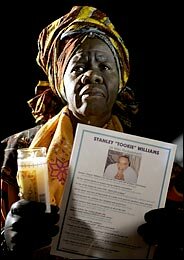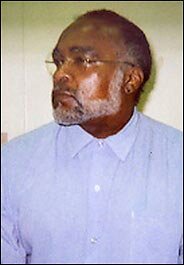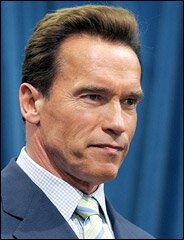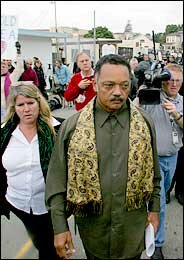|
SAN FRANCISCO, Dec. 13 - Stanley Tookie Wiliams, a condemned gangster whose execution drew more national and international attention than any here in decades, was executed by lethal injection and pronounced dead at 12:35 this morning at San Quentin State Prison.

Delois N. Blakely, an activist from Harlem, was among the demonstrators who gathered outside San Quentin prison to protest the execution of Stanley Tookie Williams.
|
Mr. Williams, 51, a co-founder and leader of the Crips gang of Los Angeles who was convicted of the brutal murders of four people in 1979 amid an avalanche of gang violence there, had become, to his supporters, an icon of jailhouse redemption and a powerful critic from his cell on death row and through his writings of the perils and misguided allure of the gang life on the nation's urban streets.
Outside the gates of San Quentin, an estimated 1,000 people held a largely peaceful vigil, reading aloud from Mr. Williams's books, with some, shortly after midnight Monday, shouting, "Long live Tookie Williams!" At 12:38 a.m., three minutes after Mr. Williams was pronounced dead - after a process that took 36 minutes and 15 seconds from the time Mr. Williams was brought into the chamber - the crowd sang "We Shall Overcome."
Gov. Arnold Schwarzenegger on Monday rejected arguments that Mr. Williams was either innocent of capital murder or deserving of mercy because of his claims of redemption, and denied a clemency petition to commute his sentence to life in prison. Late Monday, Mr. Schwarzenegger also turned down a request from the defense for a stay of execution based on a last-minute claim of innocence citing new accounts from witnesses.
And at about 11:30 p.m. Monday, the governor rejected a second request for a 60-day reprieve, a legal appeal that prison officials said slightly delayed the start of the execution, originally scheduled for 12:01.
Among the 39 witnesses - including journalists, victims' relatives, Mr. Williams's lawyers and supporters and prison officials - several of the journalists who said they had witnessed other executions described the lethal injection procedure as unusually long, as a nurse struggled to insert a needle in Mr. Williams's muscular left arm for about 12 minutes. Mr. Williams, who was strapped to what looked like a tilted-back dental chair inside the sea-foam green death chamber, appeared frustrated, witnesses, including the prison warden, said.
Several times he lifted his head from the gurney to look up at his supporters, some of who were blowing kisses, and he was mouthing "I love you," the witnesses said.
The prison warden, Steve Ornoski, said the execution was not unusually drawn out, although he did say he noticed that Mr. Williams, who appeared to be trying to help his executioners during the process, seemed exasperated.
"It depends on the person's veins and whether they are readily accessible," Mr. Ornoski said. "And also it's a high pressure assignment for someone that's in front of so many people."
Mr. Williams, who was among 651 death row inmates at San Quentin, today became the 12th man executed in the state since California reinstated the death penalty in 1978.

Death row inmate Stanley Tookie Williams sits in a visiting cell at San Quentin prison.
|
While witnesses are expected to be silent during an execution, when Mr. Williams was pronounced dead, three of the five witnesses he asked to watch him die shouted, "The state of California just killed an innocent man!"
Lora Owens, the stepmother of Albert Owens, a 26-year-old clerk at a Los Angeles 7-11 whom Mr. Williams was convicted of killing at point blank range with a sawed off shotgun, was stoic as she watched the execution, witnesses said. But after the outburst from Mr. Williams's supporters, Ms. Owens, who said earlier that the execution would finally bring justice to her stepson, broke down in tears, the witnesses said.
Besides the governor's refusal to spare his life, Mr. Williams had suffered two other setbacks Monday, as first a federal appeals court and then the Supreme Court ruled against granting a stay of execution.
In his decision denying clemency, issued less than 12 hours before Mr. Williams was scheduled to die, Mr. Schwarzenegger wrote that the case had been appealed to various courts since Mr. Williams was condemned in 1981, each one upholding his conviction.
The governor described the four murders in chilling detail, cited a long list of the evidence against Mr. Williams, and said the proof of his guilt was "strong and compelling."
"Without an apology and atonement for these senseless and brutal killings," Mr. Schwarzenegger wrote, "there can be no redemption. In this case, the one thing that would be the clearest indication of complete remorse and full redemption is the one thing Williams will not do."

Gov. Arnold Schwarzenegger denied clemency for the Crips co-founder.
|
Jesse Jackson, who joined several hundred protestors at San Quentin and visited Mr. Williams twice Monday , said he had been the first person to tell Mr. Williams about the governor's decision, which most people had agreed was to be the final word on his fate, despite the last minute legal appeals.
"I told him the clemency had been rejected," Mr. Jackson said in a telephone interview as he was leaving the prison late Monday evening. "He kind of grimaced and then he smiled and said, 'We will not give up hope.' "
The clemency request was based on what lawyers for Mr. Williams said was evidence of his dramatic turnaround in prison, where Mr. Williams became a vocal critic of gang violence, speaking out through children's books, lectures and memoirs. One memoir was the basis for a 2004 television film, "Redemption," staring Jamie Foxx, one of the many celebrities, including rap star Snoop Dogg, and activists who rushed to join the effort to save Mr. Williams's life in recent weeks.
"Our petition for clemency was based on Stanley Williams's personal redemption, his good works and positive impact that those works have had on thousands and thousands of kids across this country and on Williams's ability to continue to do those good works going forward," Jonathan Harris, one of his lawyers, said at a news conference in Sacramento on Monday.
"I have spent many an hour with Stanley Williams," Mr. Harris said, "and I refuse to accept that Stanley Williams's redemption is not genuine." He said the defense team had failed to persuade the governor to meet with Mr. Williams.
In his decision, the governor cited a planned escape by Mr. Williams while he was awaiting trial that involved his "blowing up a jail transportation bus and killing the deputies guarding the bus" as an example of behavior that is "consistent with guilt, not innocence." He also said there was no evidence that Mr. Williams's speaking out against gang violence had any effect on "the continued pervasiveness of gang violence" in crime-ridden neighborhoods.
Alice Huffman, president of the California State Conference of the N.A.A.C.P., joined Mr. Harris at the news conference and said the governor's decision to allow the execution to go forward was politically motivated. It comes at a time when he is under fire from his own party for appointing a Democrat as his new chief of staff and after the defeat of four ballot measures he supported during a special election in November.
But the governor's office declined to elaborate on his decision to deny clemency.
Polls show that a majority of Californians supports the death penalty.
As Mr. Williams's supporters rallied around the state Monday and Tuesday, with no reports of violence, as some had feared, from police, others said he deserved to be executed.

The Rev. Jesse Jackson, in front of San Quentin State Prison Monday, was among those who fought for clemency for Mr. Williams.
|
Before leaving for San Quentin to witness the execution, Ms. Owens told CNN: "I'm just glad that we're almost to the end of this. I'm glad that finally Albert is going to have the justice he deserves."
In South Los Angeles, where the Crips have been blamed for hundreds of killings, several residents said they believed that if Mr. Williams was guilty, he should be put to death.
"If he'd have killed your daughter, you'd want him dead," said Lee Johnson, 89, a retired construction worker. "He killed somebody. You got to pay for what you do."
At San Quentin at 6 p.m. Monday, officials moved Mr. Williams into what is known as the "death watch cell," a 6-by-8-foot enclosure with a toilet and a sink about 15 feet from the execution chamber. They said he was searched, given a change of clothes - blue denim jeans and a blue T-shirt - and a stack of 50 to 75 letters from friends, school children and others.
Over the next few hours, he watched some television in a guarded adjacent cell but spent most of the time on the telephone with lawyers and supporters, discussing their failed last-ditch efforts to have the governor intervene, the officials said.
Mr. Williams decided in the final hours to allow five personal witnesses to his death, the number to which he was entitled, including Barbara Becnel, his longtime friend and advocate, who will take possession of his body but who did not yet release details of funeral arrangements.
Mr. Jackson said he had tried to persuade Mr. Williams to have witnesses there, saying to him, "You need to leave with a look in the face of the people who love you and not a look in the face of the executioners. You need to have witnesses. When it's over, your friends can tell your story."
Mr. Williams did not request a last meal, although he ate oatmeal earlier in the day Monday and drank water and milk throughout the day and evening, prison officials said.
In an interview with the New York Times at the prison on Nov. 29, Mr. Williams said of the traditional last rite, "I'd be out of my mind to accept a meal from a place that wants to destroy me."
Mr. Williams's supporters and lawyers who had seen him in recent days said he was at peace with his imminent death.
But, in the Times interview he said: "To threaten me with death does not accomplish the means of the criminal justice system or satiate those who think my death or my demise will be a closure for them. Their loved ones will not rise up from the grave and love them. I wish they could. I sympathize or empathize with everyone who has lost a loved one. But I didn't do it. My death would not mollify them."
Of the execution, he said: "I'll go through it with dignity, with integrity, with love and bliss in my heart. I smile at everything, and I'm quite sure I'll smile then, too."
im Wilson/The New York Times
|